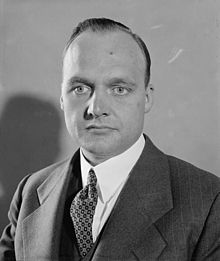O. John Rogge
| O. John Rogge | |
|---|---|

O. John Rogge at the time of his nomination in 1939 by President Franklin D. Roosevelt to be Assistant Attorney General.
|
|
| Born |
Oetje John Rogge October 12, 1903 Cass County, Illinois |
| Died | March 22, 1981 (aged 77) New York City |
| Nationality |
|
| Alma mater |
University of Illinois Harvard Law School |
| Occupation | Attorney |
| Known for | Civil liberties activism |
| Title | Assistant Attorney General of the United States |
| Term | 1939 – 1940 |
| Predecessor | Brien McMahon |
| Successor | Wendell Berge |
| Spouse(s) | Nellie Alma Luther (m. 1926) Wanda Lucille Johnston (m. 1940) |
| Children | Genevieve Oetjeanne Meyer and Hermann Rogge |
| Signature | |
Oetje John Rogge (German pronunciation: [ˈiːtʃi dʒɔn ˈɹɔɡə]) (October 12, 1903 – March 22, 1981) was an attorney who prosecuted cases for the United States government, investigated Nazi activities in the United States, and in private practice was associated with civil rights and left-wing political causes.
Oetje John Rogge was born on a farm near Springfield, Illinois, on October 12, 1903, to German immigrant parents. He graduated from the University of Illinois in 1922 where he was a member of Phi Beta Kappa and earned a law degree at Harvard, where he was on the Law Review, in 1925. He worked in private practice for several years before returning to Harvard for a year in 1930-1931 and earning his Doctor of Juristic Science degree.
Rogge entered government service in 1934, working for the Reconstruction Finance Corporation until 1937, where he became special counsel. He held the same title at the Treasury Department and served for two years as assistant general counsel at the Securities and Exchange Commission.
Rogge investigated the alleged graft and fraud practiced by the Huey Long political machine in Louisiana and successfully prosecuted several of its members on charges of mail fraud.
In May 1939, Rogge became assistant attorney general and headed the Justice Department's criminal division. On December 3, 1940, President Roosevelt wrote to Attorney General Robert H. Jackson: "I have been getting a lot of complaints about our friend Rogge–that he is a self-seeker and that he is overbearing." Rogge married Wanda Johnston in Des Moines, Iowa, on December 15, and while on his honeymoon announced plans to leave the Justice Department to become special counsel for the trustees of the Associated Gas and Electric Company, where he was tasked with handling litigation arising from the company's 1933 refinancing.
...
Wikipedia
